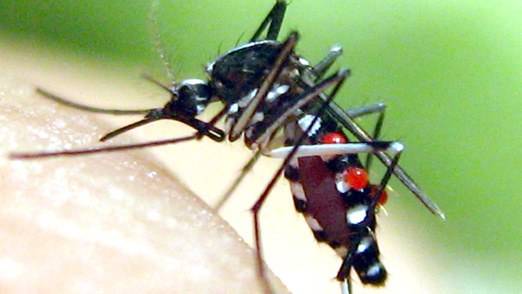Tag Archives: mosquitoes
Mosquito Spraying Begins In Pennsauken

Early Friday morning, the Mosquito Control Commission will be in the community spraying and surveilling areas throughout Camden County, including several streets in Pennsauken. During the summer and fall months, the commission schedules on an as-needed basis based upon the results of their surveillance efforts and input from the public.
Mosquito Spraying In Pennsauken On July 11

Early Thursday morning the Mosquito Control Commission will be in the community spraying and surveilling areas throughout Camden County. During the summer and fall months the commission schedules on an as-needed basis based upon the results of their surveillance efforts and input from the public.
“Tonight’s forecast shows a string of storms this evening and potentially in the early morning hours following an otherwise dry summer day,” said Freeholder Jeff Nash, liaison to the Camden County Mosquito Commission. “Mosquitos need standing water to breed, so the first thing you should do after any rain is check your yard and remove any standing water to help eliminate the threat. This simple act can help reduce the pest population in your neighborhood, and assist the efforts of the Camden County Mosquito Control Commission.”
Camden County Mosquito Commission will be conducting ULV “spraying” operations on Thursday, July 11 between the hours of 2am-6am in the following locations in Pennsauken, weather permitting:
- Henwood Ave.
- Walton Ave.
- Garden Ave.
- Royal Ave.
- Browning Road
- Witherspoon Ave.
- Beacon Ave.
- Roosevelt Ave.
- Camden Ave.
- 43rd Street
- N. 42nd Street
- 41st Street
- Jackson Ave.
- Johnson Ct.
- Velde Ave.
- Day Ave.
- Engard Ave.
- Bannard Ave.
- River Road
- Hillside Terrace
- Forrest Ave.
- Sharon Terrace
- Sylvan Terrace
- 41st Street
“The commission works with the Public Health Environmental Laboratories in Trenton to verify the presence of West Nile Virus and other communicable diseases in their samples,” Nash said. “If a pool tests positive, the Mosquito Commission returns to spray the area. The sprayings take place when the mosquitoes are most active.”
The mosquito spray is not harmful to humans or pets, but you should avoid direct contact if you have respiratory concerns or are sensitive to irritants.
Residents should check their property for any object that holds water for more than a few days. All pre-adult mosquito stages (eggs, larvae, and pupae) must be in stagnant water in order to develop into adult mosquitoes.
- Swimming pools are a common problem. All pools must be checked and maintained to keep them mosquito-free. Swimming pools can breed mosquitoes within days after you stop adding chlorine or other disinfectant. Pool covers can catch rainwater and become a mosquito development site. Add a little chlorine to kill mosquitoes.
- Maintain screens to prevent adult mosquitoes from entering your home or business.
- Personal protection is strongly urged if you are outside when mosquitoes may be active—generally dawn and dusk. Insect repellants containing between 10-35% DEET are very effective, however, be sure to follow the label directions and take extra precautions with children and infants.
The Camden County Mosquito Commission suggests checking around your yard for mosquito breeding containers. The following is a checklist of tips to help eliminate mosquito breeding:
- Dispose of unnecessary containers that hold water. Containers you wish to save turn upside down or put holes in the bottom so all water drains out.
- Lift up flowerpots and dump the water from the dish underneath every week.
- Stock fish or add mosquito larvicide to ornamental ponds.
- Change water in bird baths, fountains, and animal troughs weekly.
- Screen vents to septic and other water tanks.
- Store large boats so they drain and small boats upside down. If covered, keep the tarp tight so water does not pool on top of the tarp.
- Do not dump leaves or grass clippings into a catch basin or streams.
- Do not allow water to collect on sagging tarps or awnings.
- Do not allow trashcan lids to fill with water.
- Check downspouts that are able to hold enough water to allow mosquito larvae to mature.
For more information, or to report a problem, contact the Camden County Mosquito Commission at (856) 566-2945 or skeeters@camdencounty.com.
Mosquito Spraying In Pennsauken On July 2
Mosquito Spraying In Pennsauken And Merchantville Rescheduled

Due to inclement weather, mosquito sprayings scheduled for this week have been postponed and rescheduled. The Mosquito Control Commission will be in the community spraying and surveilling areas throughout Camden County, including Pennsauken and Merchantville. During the summer and fall months the commission schedules on an as-needed basis based upon the results of their surveillance efforts and input from the public.
Mosquito Spraying In Pennsauken On June 14
Mosquito Spraying In Pennsauken On August 30
Mosquito Spraying In Pennsauken On Wedensday
Mosquito Commission To Spray In Pennsauken On July 13

The Camden County Mosquito Commission regularly checks several thousand suspected mosquito breeding sites across the county. Spraying is scheduled on an as needed basis based upon the results of their surveillance efforts.
“It is important that you regularly check your yard for the presence of standing water,” said Freeholder Jeff Nash, liaison to the Camden County Mosquito Commission. “Removing standing water where mosquitoes can thrive will protect your family from the pests, and will assist the efforts of the Camden County Mosquito Control Commission.”
First Mosquito Spraying Of The Season In Pennsauken On Tuesday

The Camden County Mosquito Commission regularly checks several thousand suspected mosquito breeding sites across the county. Spraying is scheduled on an as needed basis based upon the results of their surveillance efforts.
“It is important that you regularly check your yard for the presence of standing water,” said Freeholder Jeff Nash, liaison to the Camden County Mosquito Commission. “Removing standing water where mosquitoes can thrive will protect your family from the pests, and will assist the efforts of the Camden County Mosquito Control Commission.”
The commission will conduct spraying on June 19 from 2 to 6 a.m. in the following locations in the Township:
Pennsauken
- River Road
- Holman Avenue
- Barrows Avenue
- Lennox Road till Holman
“The commission works with the Public Health Environmental Laboratories in Trenton to verify the presence of West Nile Virus and other communicable diseases in their samples,” Nash said. “If a pool tests positive, the Mosquito Commission returns to spray the area. The sprayings take place when the mosquitoes are most active.”
The mosquito spray is not harmful to humans or pets, but you should avoid direct contact if you have respiratory concerns or are sensitive to irritants.
The Camden County Mosquito Commission suggests checking around your yard for mosquito breeding containers. The following is a checklist of tips to help eliminate mosquito breeding:
- Dispose of unnecessary containers that hold water. Containers you wish to save turn upside down or put holes in the bottom so all water drains out.
- Lift up flowerpots and dump the water from the dish underneath every week.
- Stock fish or add mosquito larvicide to ornamental ponds.
- Change water in bird baths, fountains, and animal troughs weekly.
- Screen vents to septic and other water tanks.
- Store large boats so they drain and small boats upside down. If covered, keep the tarp tight so water does not pool on top of the tarp.
- Do not dump leaves or grass clippings into a catch basin or streams.
- Do not allow water to collect on sagging tarps or awnings.
- Do not allow trashcan lids to fill with water.
- Check downspouts that are able to hold enough water to allow mosquito larvae to mature.
For more information, or to report a problem, contact the Camden County Mosquito Commission at (856) 566-2945 or skeeters@camdencounty.com.
Camden County Mosquito Commission To Spray In Pennsauken
The Camden County Mosquito Commission regularly checks several thousand suspected mosquito breeding sites across the county. Spraying is scheduled on an as needed basis based upon the results of their surveillance efforts.
“Although it may be fall, that doesn’t mean that mosquitoes won’t continue to be a threat,” said Freeholder Jeff Nash, liaison to the Camden County Mosquito Commission. “It is still important to check your yard for the presence of standing water. Removing standing water where mosquitoes can thrive will protect your family from the pests, and will assist the efforts of the Camden County Mosquito Control Commission.”
The commission will conduct spraying on October 20 from 2 to 6 a.m. in the following locations in Pennsauken:
Pennsauken Township
- Bannard Ave
- Stow Rd
- River Rd
- Union Ave
- Bridgeview Ave
- Adams Ave
- Zimmerman Ave
- Morgan Ave
- Curtis Ave
- Velde Ave
- Engard Ave
- Delair Ave
“The commission works with the Public Health Environmental Laboratories in Trenton to verify the presence of West Nile Virus and other communicable diseases in their samples,” Nash said. “If a pool tests positive, the Mosquito Commission returns to spray the area. The sprayings take place when the mosquitoes are most active.”
The mosquito spray is not harmful to humans or pets, but you should avoid direct contact if you have respiratory concerns or are sensitive to irritants.
“Although there have been no locally transmitted cases of Zika Virus from mosquitoes reported in New Jersey at this time, the Camden County Department of Health and Human Services is working closely with the CDC and the New Jersey Department of Health to actively monitor the situation,” said Freeholder Carmen Rodriguez, liaison to the Camden County Department of Health and Human Services.
Residents should check their property for any object that holds water for more than a few days. All pre-adult mosquito stages (eggs, larvae, and pupae) must be in stagnant water in order to develop into adult mosquitoes.
- Swimming pools are a common problem. All pools must be checked and maintained to keep them mosquito-free. Swimming pools can breed mosquitoes within days after you stop adding chlorine or other disinfectant. Pool covers can catch rainwater and become a mosquito development site. Add a little chlorine to kill mosquitoes.
- Maintain screens to prevent adult mosquitoes from entering your home or business.
- Personal protection is strongly urged if you are outside when mosquitoes may be active—generally dawn and dusk. Insect repellants containing between 10-35% DEET are very effective, however, be sure to follow the label directions and take extra precautions with children and infants.
The Camden County Mosquito Commission suggests checking around your yard for mosquito breeding containers. The following is a checklist of tips to help eliminate mosquito breeding:
- Dispose of unnecessary containers that hold water. Containers you wish to save turn upside down or put holes in the bottom so all water drains out.
- Lift up flowerpots and dump the water from the dish underneath every week.
- Stock fish or add mosquito larvicide to ornamental ponds.
- Change water in bird baths, fountains, and animal troughs weekly.
- Screen vents to septic and other water tanks.
- Store large boats so they drain and small boats upside down. If covered, keep the tarp tight so water does not pool on top of the tarp.
- Do not dump leaves or grass clippings into a catch basin or streams.
- Do not allow water to collect on sagging tarps or awnings.
- Do not allow trashcan lids to fill with water.
- Check downspouts that are able to hold enough water to allow mosquito larvae to mature.
For more information, or to report a problem, contact the Camden County Mosquito Commission at (856) 566-2945 or skeeters@camdencounty.com.

